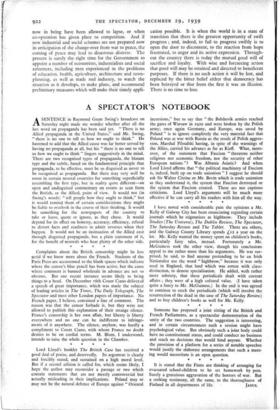A SPECTATOR'S NOTEBOOK A SENTENCE in Raymond Gram Swing's broadcast
on Saturday night made me wonder whether after all the last word on propaganda has been said yet. " There is no Allied propaganda in the United States," said Mr. Swing, " there is no one to tell us how we ought to think." He hastened to add that the Allied cause was far better served by having no propaganda at all, but his " there is no one to tell us how we ought to think " lingers suggestively in the mind. There are two recognised types of propaganda, the blatant type and the subtle, based on the fundamental principle that propaganda, to be effective, must be so disguised as never to be recognised as propaganda. But there may very well be room in certain neutral countries for something superficially resembling the first type, but in reality quite different—an open and undisguised commentary on events as seen from the British, or the Allied, point of view. It would not (in Swing's words) " tell people how they ought to think," but it would remind them of certain considerations they might be liable to overlook in the course of their thinking. It would be something for the newspapers of the- country to take or leave, quote or ignore, as they chose. It would depend for its effect on honesty, accuracy, efficiency, refusal to distort facts and readiness to admit reverses when they happen. It would not be an insinuation of the Allied case through disguised propaganda, but a plain statement of it, for the benefit of neutrals who hear plenty of the other side.
* * * *






























 Previous page
Previous page